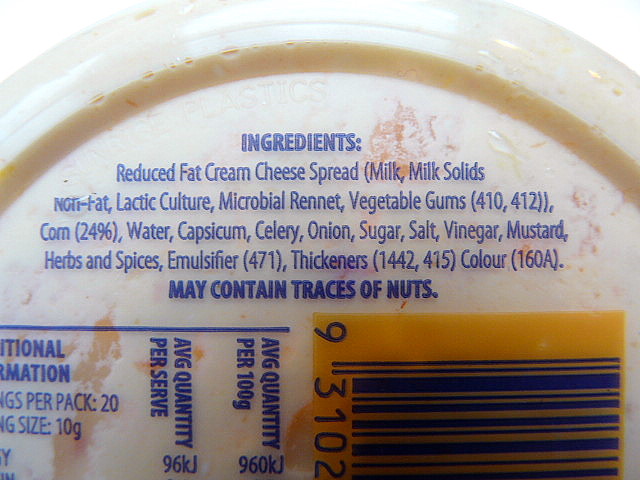Emulsifier In Food: Key Ingredient for Smooth Frozen Desserts
Wiki Article
Everything about the Role of an Emulsifier in Food and Its Significance in Modern Cuisine
Emulsifiers are pivotal in modern food, assisting in the mix of immiscible fluids like oil and water. Their capacity to maintain combinations improves the structure and flavor of various food. From salad dressings to baked goods, emulsifiers play a substantial role in both commercial and home food preparation. Yet, the science behind their function and the future developments in their usage stay much less checked out. Emulsifier In Food. What more could be discovered regarding these necessary cooking agents?Recognizing Emulsification: The Scientific Research Behind the Refine
Although emulsification might appear like a straightforward culinary technique, it includes intricate clinical concepts that are essential for developing stable mixtures of immiscible fluids, such as oil and water. At the heart of this process lies the principle of surface stress, which prevents the two liquids from mixing naturally. Emulsifiers, compounds that decrease surface area tension, play a crucial duty in helping with the combination of these fluids. They have both hydrophilic (water-attracting) and hydrophobic (water-repelling) homes, allowing them to secure themselves at the user interface between oil and water.When an emulsifier is introduced and the combination is upset, it develops a protective barrier around distributed droplets of one liquid within the various other, maintaining the mixture. This action not just enhances structure and mouthfeel in food items however additionally contributes to their aesthetic appeal. Emulsifier In Food. Comprehending the science behind emulsification is fundamental in modern cuisine, allowing cooks to produce a variety of sauces, dressings, and emulsified recipes
Usual Sorts Of Emulsifiers Utilized in Food
Emulsifiers are crucial active ingredients in the food sector, playing a vital function in maintaining blends of oil and water. Different sorts of emulsifiers are commonly made use of, each with special buildings matched for different applications. Lecithin, stemmed from soybeans or egg yolks, is among one of the most prominent all-natural emulsifiers, usually discovered in delicious chocolates and dressings. Mono- and diglycerides, which are derived from glycerol and fats, are commonly utilized in baked products and margarine to improve structure and expand life span. One more typical emulsifier is polysorbate 80, preferred for its capability to boost the uniformity of gelato and sauces. Additionally, xanthan gum and guar gum tissue offer as thickening agents that also add to emulsification in gluten-free products. These emulsifiers are integral to developing a secure, tasty product in modern food formulas, making certain a pleasurable sensory experience for consumers.
The Role of Emulsifiers in Different Food Products
A selection of food items depend on emulsifiers to accomplish desired textures and security. These compounds promote the blending of immiscible fluids, such as oil and water, which is necessary in lots of processed foods. In salad dressings, emulsifiers help maintain a regular combination, avoiding separation and enhancing rack life. In baked goods, they contribute to a consistent crumb framework and wetness retention, improving total top quality.Emulsifiers also play a considerable function in dairy products, such as ice lotion and yogurt, where they maintain fat blobs, making certain a smooth mouthfeel. Additionally, in sauces and dressings, they enhance thickness and enhance spreadability. This performance is essential in the production of delicious chocolates, margarine, and mayo, where a natural product is required. Generally, the use of emulsifiers in numerous food products is essential to modern food manufacturing, boosting stability and consistency across a vast range of items.
How Emulsifiers Enhance Appearance and Taste

When incorporated right into foodstuff, emulsifiers considerably enhance both structure and flavor, producing a more delightful consuming experience. These substances assist in the blending of components that generally do not blend well, such as oil and water, leading to a smoother, creamier consistency. This not only boosts mouthfeel however likewise allows tastes to distribute uniformly throughout the item, magnifying the overall taste.

Emulsifiers in Home Cooking: Tips and Techniques
Just how can original site home cooks successfully utilize emulsifiers to improve their meals? Emulsifiers play an essential duty in achieving preferable appearances and flavors in homemade dishes. Making use of egg yolks in mayonnaise or hollandaise sauce allows for a secure emulsion, integrating oil and water properly. Home cooks can also explore mustard, which serves check these guys out as an emulsifier in vinaigrettes, ensuring a smooth uniformity.In cooking, including lecithin, located in egg yolks or soy, can boost dough security and dampness retention. In addition, using industrial emulsifiers like xanthan periodontal or guar gum tissue can aid thicken sauces and dressings while maintaining a creamy mouthfeel.
When developing gelato or whipped garnishes, emulsifiers can protect against ice crystal development, resulting in a smoother structure. By understanding these strategies, home chefs can substantially boost their culinary productions, offering satisfying and consistent meals that display the power of emulsification.
The Future of Emulsifiers in Culinary Technology
As the cooking world remains to progress, the function of emulsifiers is positioned to come to be increasingly cutting-edge and diverse. Breakthroughs in food science are bring about the development of new emulsifying representatives stemmed from all-natural resources, which accommodate health-conscious consumers and straight from the source boost the sensory high qualities of meals. Developments such as plant-based emulsifiers are obtaining traction, allowing cooks to develop vegan and allergen-free choices without jeopardizing texture or taste.In addition, making use of emulsifiers in molecular gastronomy is expanding, allowing cooks to explore special appearances and presentations that captivate diners. As sustainability ends up being a top priority, the future may see a change in the direction of environment-friendly emulsifiers that lower environmental effect.
Ultimately, emulsifiers will remain to play a vital function in culinary advancement, linking the gap between custom and modernity, and allowing cooks to press the limits of creative thinking in their kitchen areas.
Regularly Asked Inquiries

Are Emulsifiers Safe for People With Allergies?
Emulsifiers can be safe for individuals with allergic reactions, depending upon their particular level of sensitivities. Particular emulsifiers, derived from allergenic sources like soy or eggs, might cause reactions, requiring careful active ingredient analysis and consultation with health care specialists.Just How Do Emulsifiers Affect Food Rack Life?
Emulsifiers improve food service life by stabilizing combinations, protecting against splitting up, and reducing microbial growth. This stability assists keep texture and taste over time, permitting products to stay secure and appealing for intake much longer than without emulsifiers.Can Emulsifiers Be Derived From All-natural Resources?
Yes, emulsifiers can be acquired from all-natural resources such as plants, eggs, and milk items (Emulsifier In Food). These all-natural emulsifiers assist stabilize combinations, enhancing structure and consistency in numerous food applications while being preferred for health-conscious customersWhat Are the Environmental Effects of Emulsifier Manufacturing?
The ecological effects of emulsifier production consist of resource depletion, habitat destruction, and contamination from artificial procedures. Natural emulsifier sourcing can reduce some impacts, yet in general, industrial practices still present substantial eco-friendly difficulties to communities worldwide.

Exist Vegan Emulsifiers Available out there?
Yes, there are several vegan emulsifiers available in the market, such as lecithin stemmed from soy or sunflower, guar gum tissue, and xanthan gum tissue. These alternatives deal with plant-based diets without jeopardizing emulsifying homes.Emulsifiers are vital components in the food sector, playing an essential function in supporting mixes of oil and water. A variety of food products count on emulsifiers to attain wanted structures and stability. When incorporated into food items, emulsifiers substantially improve both structure and flavor, creating an even more satisfying eating experience. In addition, emulsifiers can maintain air pockets in whipped items like lotions and mousses, leading to a light and ventilated texture. Emulsifiers enhance food shelf life by supporting combinations, stopping splitting up, and minimizing microbial growth.
Report this wiki page